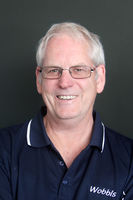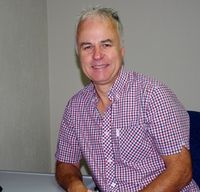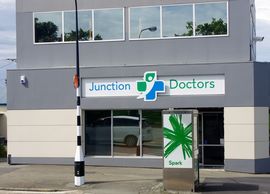Waitaki > GPs / Accident & Urgent Medical Care > WellSouth Primary Health Network >
Junction Doctors
General Practice (GP) Service
Today
8:30 AM to 5:00 PM.
Description
Junction Doctors is our satellite clinic for North End Health Centre on the South Hill.
Staff
Our team is made up of 3 GPs (see details below under “General Practitioners”) and:
Practice Manager: Sreeja Surej
Nursing Staff: Liji, Nikita
Receptionists: Mary Claire, Shelley, Cathryn, Becky, Ros
Doctors
-
Dr Matthew Bailey
General Practitioner- Vocationally registered
-

Dr Sarah Grant
General Practitioner - Vocationally Registered
-

Dr Gladys Hayes
General Practitioner - Vocationally Registered
-

Dr Grahame Jelley
General Practitioner - Vocationally Registered
-

Dr Jamie McCullough
General Practitioner - Vocationally Registered
-

Dr Helena Robinson
Registrar
-

Dr David Whittet
General Practitioner- Vocationally Registered
-

Dr Andrew Wilson
Principal General Practitioner - Vocationally Registered
How do I access this service?
Enrolled patients, Make an appointment
Enrolling new patients
Fees
Enrolled Patient Fees
| Age Range | Without CSC | With CSC |
|---|---|---|
| Under 6 years | Free | Free |
| 6 to 13 years | Free | Free |
| 14 to 17 years | $40.00 | $13.50 |
| 18 to 24 years | $58.00 | $20.00 |
| 25 to 44 years | $58.00 | $20.00 |
| 45 to 64 years | $58.00 | $20.00 |
| 65+ years | $58.00 | $20.00 |
There is a standard fee. Complex problems, minor surgeries and materials will have an extra fee added.
For ACC consultations, a surcharge plus materials used cost will be charged (ACC no longer covers the full cost).
If you have any problems with payment, please discuss confidentially with the Reception Team.
| Enrolled patients consult | ACC | On-Call* | |
| Under 14 | Free | Free | Free |
| 14-17 | $40 | $38 | $70 |
| Adults | $58 | $38 | $95 |
| CSC Holder 14-17 | $13.50 | $13.50 | $60 |
| CSC Holder Adults | $20.00 | $20.00 | $60 |
*On-Call Weekend Duty at Practice
Patients not enrolled at our practice will be charged a 'casual' rate $80 (NZ/Australia/United Kingdom) Casual other countries $85
UNDER 14 After Hours FREE
Home Visits are charged depending on time of call out.
Hours
8:30 AM to 5:00 PM.
| Mon – Fri | 8:30 AM – 5:00 PM |
|---|
After Hours: Call 03 434 9444 for on call GP
This is a satellite practice of North End Health Centre
Public Holidays: Closed Waitangi Day (6 Feb), Otago Anniversary (23 Mar), Good Friday (3 Apr), Easter Sunday (5 Apr), Easter Monday (6 Apr), ANZAC Day (observed) (27 Apr), King's Birthday (1 Jun), Matariki (10 Jul), Labour Day (26 Oct).
Languages Spoken
English
Services Provided
Your GP's surgery is far more than a place to go when you are feeling unwell and needing a quick cure. The doctor who sees you has gone through an extensive medical training to equip her or him to help children and adults of all ages with a range of physical and emotional difficulties. GPs are at the centre of the healthcare hub and will be aware of services and expertise that are available locally and further-a-field. GPs are also aware of the link that stress and unhappy life events have on physical health so know when to suggest a talking therapy rather than medication.
Your GP's surgery is far more than a place to go when you are feeling unwell and needing a quick cure. The doctor who sees you has gone through an extensive medical training to equip her or him to help children and adults of all ages with a range of physical and emotional difficulties. GPs are at the centre of the healthcare hub and will be aware of services and expertise that are available locally and further-a-field. GPs are also aware of the link that stress and unhappy life events have on physical health so know when to suggest a talking therapy rather than medication.
Your GP's surgery is far more than a place to go when you are feeling unwell and needing a quick cure. The doctor who sees you has gone through an extensive medical training to equip her or him to help children and adults of all ages with a range of physical and emotional difficulties. GPs are at the centre of the healthcare hub and will be aware of services and expertise that are available locally and further-a-field. GPs are also aware of the link that stress and unhappy life events have on physical health so know when to suggest a talking therapy rather than medication.
Health screening tests check for health conditions or early warning signs of disease.
Health screening tests check for health conditions or early warning signs of disease.
- Cervical screening
Health screening tests check for health conditions or early warning signs of disease.
Primary care practices offer a range of services and are able to deal with most minor accident care. If they are not able to deal with an injury they will refer on to the appropriate service.
Primary care practices offer a range of services and are able to deal with most minor accident care. If they are not able to deal with an injury they will refer on to the appropriate service.
Primary care practices offer a range of services and are able to deal with most minor accident care. If they are not able to deal with an injury they will refer on to the appropriate service.
Each GP surgery or primary care practice will have its own procedure for repeat prescribing but the following rules are common to most, if not all. Patients who are well-known to the practice who have a stable condition like asthma, hypertension or diabetes could be allowed to get a repeat prescription for up to six months. Repeat prescriptions are never given to patients who are not known to the practice and there is probably a blanket ban on repeats for narcotics and other drugs that could be misused as doctors are expected to monitor these drugs carefully.
Each GP surgery or primary care practice will have its own procedure for repeat prescribing but the following rules are common to most, if not all. Patients who are well-known to the practice who have a stable condition like asthma, hypertension or diabetes could be allowed to get a repeat prescription for up to six months. Repeat prescriptions are never given to patients who are not known to the practice and there is probably a blanket ban on repeats for narcotics and other drugs that could be misused as doctors are expected to monitor these drugs carefully.
Each GP surgery or primary care practice will have its own procedure for repeat prescribing but the following rules are common to most, if not all. Patients who are well-known to the practice who have a stable condition like asthma, hypertension or diabetes could be allowed to get a repeat prescription for up to six months. Repeat prescriptions are never given to patients who are not known to the practice and there is probably a blanket ban on repeats for narcotics and other drugs that could be misused as doctors are expected to monitor these drugs carefully.
Sometimes your doctor needs to take a sample of blood or urine either to discover what is wrong with you or to measure something in your blood so that the right medication is given to you. These tests could be anything from blood sugar to a full blood count or a sample of tissue to test for cancer. While urine can generally be tested in the surgery, blood and other specimens are usually sent away for testing at a laboratory. Most results come back within 48 hours unless a very rare test is needed which has to go to a specialist lab further away when it might take a little longer.
Sometimes your doctor needs to take a sample of blood or urine either to discover what is wrong with you or to measure something in your blood so that the right medication is given to you. These tests could be anything from blood sugar to a full blood count or a sample of tissue to test for cancer. While urine can generally be tested in the surgery, blood and other specimens are usually sent away for testing at a laboratory. Most results come back within 48 hours unless a very rare test is needed which has to go to a specialist lab further away when it might take a little longer.
Sometimes your doctor needs to take a sample of blood or urine either to discover what is wrong with you or to measure something in your blood so that the right medication is given to you. These tests could be anything from blood sugar to a full blood count or a sample of tissue to test for cancer.
While urine can generally be tested in the surgery, blood and other specimens are usually sent away for testing at a laboratory. Most results come back within 48 hours unless a very rare test is needed which has to go to a specialist lab further away when it might take a little longer.
Liquid nitrogen is a fast, effective treatment provided in many practices to treat viral warts, sun damaged skin, skin tags and many benign cosmetic lesions. It comes in a container with a nozzle and is usually applied by swab or spray. Often one treatment is all that is needed but sometimes it may need repeating after two weeks. Because it cannot be stored for too long, you will often find that your GP will treat a number of patients one after the other. For more information click here.
Liquid nitrogen is a fast, effective treatment provided in many practices to treat viral warts, sun damaged skin, skin tags and many benign cosmetic lesions. It comes in a container with a nozzle and is usually applied by swab or spray. Often one treatment is all that is needed but sometimes it may need repeating after two weeks. Because it cannot be stored for too long, you will often find that your GP will treat a number of patients one after the other. For more information click here.
Liquid nitrogen is a fast, effective treatment provided in many practices to treat viral warts, sun damaged skin, skin tags and many benign cosmetic lesions. It comes in a container with a nozzle and is usually applied by swab or spray. Often one treatment is all that is needed but sometimes it may need repeating after two weeks.
Because it cannot be stored for too long, you will often find that your GP will treat a number of patients one after the other.
For more information click here.
All women and people with a cervix aged 25 – 69 who have ever had intimate skin-to-skin contact or been sexually active should have regular cervical screening. This includes women who have been immunised against HPV. Together, regular screening and HPV immunisation provide the best protection against cervical cancer. There are now more options for how you have cervical screening done: a simple vaginal swab test for HPV, either done yourself or with help from a healthcare professional a cervical sample taken by a healthcare professional (used to be known as a smear test). Talk with your healthcare provider to decide which option is best for you. If HPV is found, you may need to have a follow-up test or be referred directly for colposcopy. If you’ve not yet had HPV testing, you should be screened 3 years after your last test (or 1 year if immune deficient). Once you have had an HPV test, and providing HPV is not found, your next screening will be in 5 years (or 3 years if immune deficient). For more information: Cervical screening | Time to Screen - National Screening Unit
All women and people with a cervix aged 25 – 69 who have ever had intimate skin-to-skin contact or been sexually active should have regular cervical screening. This includes women who have been immunised against HPV. Together, regular screening and HPV immunisation provide the best protection against cervical cancer. There are now more options for how you have cervical screening done: a simple vaginal swab test for HPV, either done yourself or with help from a healthcare professional a cervical sample taken by a healthcare professional (used to be known as a smear test). Talk with your healthcare provider to decide which option is best for you. If HPV is found, you may need to have a follow-up test or be referred directly for colposcopy. If you’ve not yet had HPV testing, you should be screened 3 years after your last test (or 1 year if immune deficient). Once you have had an HPV test, and providing HPV is not found, your next screening will be in 5 years (or 3 years if immune deficient). For more information: Cervical screening | Time to Screen - National Screening Unit
All women and people with a cervix aged 25 – 69 who have ever had intimate skin-to-skin contact or been sexually active should have regular cervical screening. This includes women who have been immunised against HPV. Together, regular screening and HPV immunisation provide the best protection against cervical cancer.
There are now more options for how you have cervical screening done:
- a simple vaginal swab test for HPV, either done yourself or with help from a healthcare professional
- a cervical sample taken by a healthcare professional (used to be known as a smear test).
Talk with your healthcare provider to decide which option is best for you.
If HPV is found, you may need to have a follow-up test or be referred directly for colposcopy.
If you’ve not yet had HPV testing, you should be screened 3 years after your last test (or 1 year if immune deficient). Once you have had an HPV test, and providing HPV is not found, your next screening will be in 5 years (or 3 years if immune deficient).
For more information: Cervical screening | Time to Screen - National Screening Unit
Another service offered to you at your GP surgery (primary care practice) is advice and immunisation before you go to another country. While you are likely to have the immunisations needed to live in New Zealand, there may be other injections you need to protect yourself before going for example to Africa or South America. In some places you will need protection from rabies or malaria. Yellow fever vaccinations are only available at approved centres; please click here to view the centres in New Zealand. Your doctor will be able to tell you what diseases you will need to be protected from in any named country and advise you on other medical matters.
Another service offered to you at your GP surgery (primary care practice) is advice and immunisation before you go to another country. While you are likely to have the immunisations needed to live in New Zealand, there may be other injections you need to protect yourself before going for example to Africa or South America. In some places you will need protection from rabies or malaria. Yellow fever vaccinations are only available at approved centres; please click here to view the centres in New Zealand. Your doctor will be able to tell you what diseases you will need to be protected from in any named country and advise you on other medical matters.
Another service offered to you at your GP surgery (primary care practice) is advice and immunisation before you go to another country. While you are likely to have the immunisations needed to live in New Zealand, there may be other injections you need to protect yourself before going for example to Africa or South America. In some places you will need protection from rabies or malaria. Yellow fever vaccinations are only available at approved centres; please click here to view the centres in New Zealand. Your doctor will be able to tell you what diseases you will need to be protected from in any named country and advise you on other medical matters.
All New Zealand children are entitled to 11 free health checks from birth to three years. The checks aim to ensure that children are growing and developing as well as possible. Included in the checks are clinical assessment, health education and family/whanau support. Baby checks are at birth and then at 24 hours, five days and around 2-4 weeks. Babies are weighed and measured to ensure that they are developing correctly. These sessions provide a great opportunity for parents to ask questions from an expert and have any problem addressed; difficulties with breastfeeding or sleep for example. They can also be used to discuss immunisations and vaccinations. These checks will be carried out by your lead maternity carer (LMC). Between the ages of 4-6 weeks and three years, there are seven core health checks available, typically these are around 4-6 weeks, 8-10 weeks, 3-4 months, 5-7 months, 9-12 months, 15-18 months and 2-3 years. These checks may be carried out by a Well Child Provider of your choice e.g. Plunket, Maori health provider, community nurse, a general practice team (doctor and practice nurse). Your LMC will be able to give you a list of Well Child Providers in your area. More information about Well Child services is available on the Ministry of Health website.
All New Zealand children are entitled to 11 free health checks from birth to three years. The checks aim to ensure that children are growing and developing as well as possible. Included in the checks are clinical assessment, health education and family/whanau support. Baby checks are at birth and then at 24 hours, five days and around 2-4 weeks. Babies are weighed and measured to ensure that they are developing correctly. These sessions provide a great opportunity for parents to ask questions from an expert and have any problem addressed; difficulties with breastfeeding or sleep for example. They can also be used to discuss immunisations and vaccinations. These checks will be carried out by your lead maternity carer (LMC). Between the ages of 4-6 weeks and three years, there are seven core health checks available, typically these are around 4-6 weeks, 8-10 weeks, 3-4 months, 5-7 months, 9-12 months, 15-18 months and 2-3 years. These checks may be carried out by a Well Child Provider of your choice e.g. Plunket, Maori health provider, community nurse, a general practice team (doctor and practice nurse). Your LMC will be able to give you a list of Well Child Providers in your area. More information about Well Child services is available on the Ministry of Health website.
All New Zealand children are entitled to 11 free health checks from birth to three years. The checks aim to ensure that children are growing and developing as well as possible. Included in the checks are clinical assessment, health education and family/whānau support.
Baby checks are at birth and then at 24 hours, five days and around 2-4 weeks. Babies are weighed and measured to ensure that they are developing correctly. These sessions provide a great opportunity for parents to ask questions from an expert and have any problem addressed; difficulties with breastfeeding or sleep for example. They can also be used to discuss immunisations and vaccinations. These checks will be carried out by your lead maternity carer (LMC).
Between the ages of 4-6 weeks and three years, there are seven core health checks available, typically these are around 4-6 weeks, 8-10 weeks, 3-4 months, 5-7 months, 9-12 months, 15-18 months and 2-3 years. These checks may be carried out by a Well Child Provider of your choice e.g. Plunket, Māori health provider, community nurse, a general practice team (doctor and practice nurse). Your LMC will be able to give you a list of Well Child Providers in your area.
More information about Well Child services is available on the Ministry of Health website.
Immunisation is the safest and most effective way to provide protection for you and your tamariki’s health. For more information view the NZ immunisation schedule.
Immunisation is the safest and most effective way to provide protection for you and your tamariki’s health. For more information view the NZ immunisation schedule.
- Travel vaccinations
- Pregnancy vaccinations
- Childhood immunisation programme
- Catch-up missed vaccinations
- 45 year old vaccinations
- 65 year old vaccinations
- Adult flu vaccine
- Child flu vaccine
- COVID-19 vaccination and boosters
- Diphtheria / Tetanus / Pertussis (whooping cough) vaccine
- Human Papillomavirus (HPV) vaccine
- Measles / Mumps / Rubella (MMR) vaccine
- Meningococcal vaccine
- Respiratory syncytial virus (RSV) vaccine
- Shingles vaccine
- Privately funded vaccinations
Immunisation is the safest and most effective way to provide protection for you and your tamariki’s health. For more information view the NZ immunisation schedule.
Our practice has got a designated diving doctor who can offer industrial diving medical examinations. Please contact the practice on 03 437 0347 for more details.
Our practice has got a designated diving doctor who can offer industrial diving medical examinations. Please contact the practice on 03 437 0347 for more details.
Our practice has got a designated diving doctor who can offer industrial diving medical examinations. Please contact the practice on 03 437 0347 for more details.
Disability Assistance
Wheelchair access
Online Booking URL
Document Downloads
- Enrolment Form (PDF, 140.8 KB)
Website
Contact Details
81 Wansbeck Street, Ōamaru
Waitaki
8:30 AM to 5:00 PM.
-
Phone
(03) 434 2112
Healthlink EDI
northend
Email
Website
81 Wansbeck Street
Oamaru
OTA 9400
Street Address
81 Wansbeck Street
Ōamaru
OTA 9400
Postal Address
PO Box 166
Ōamaru 9400
Was this page helpful?
This page was last updated at 11:03AM on October 24, 2025. This information is reviewed and edited by Junction Doctors.

